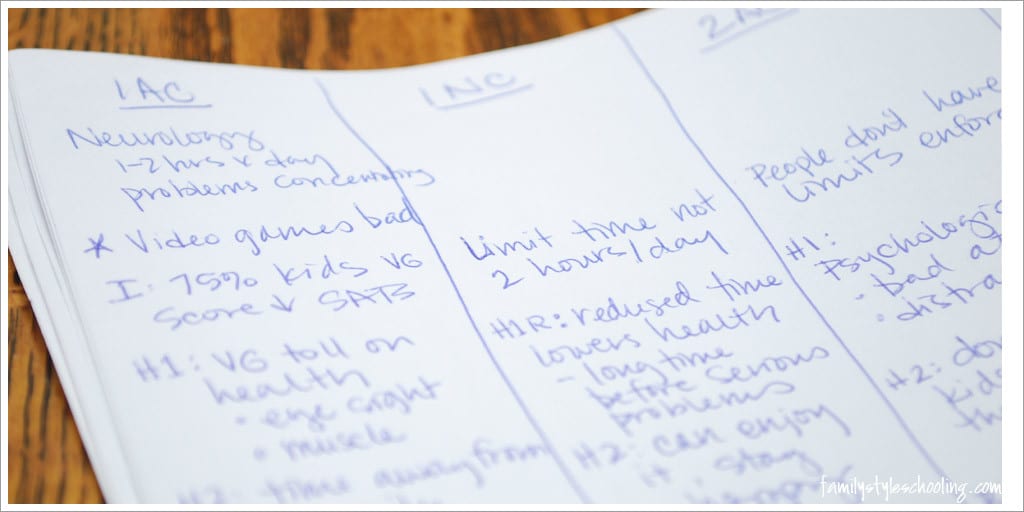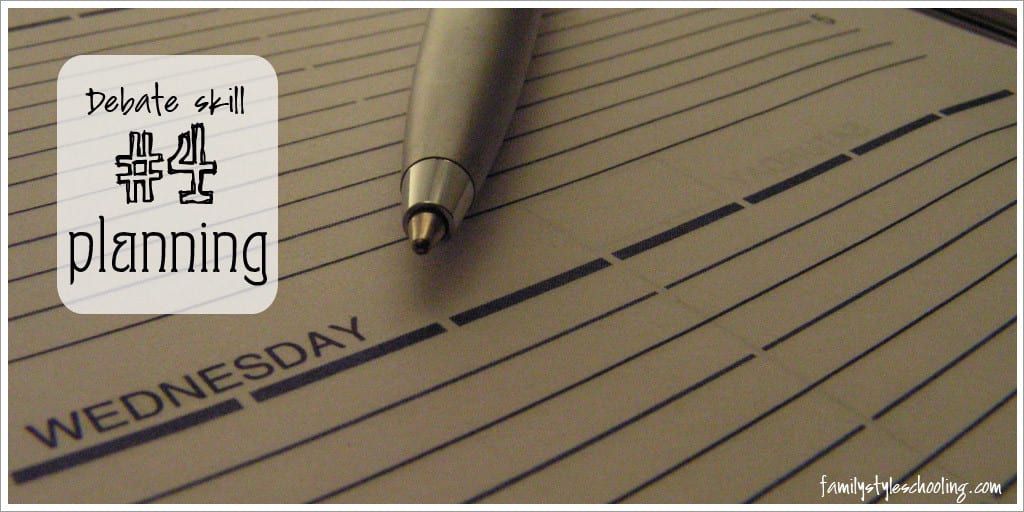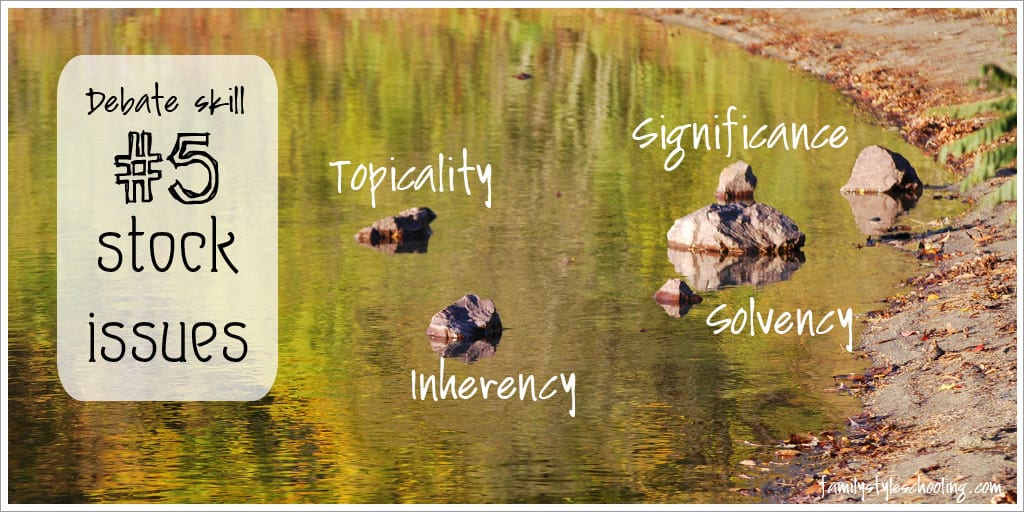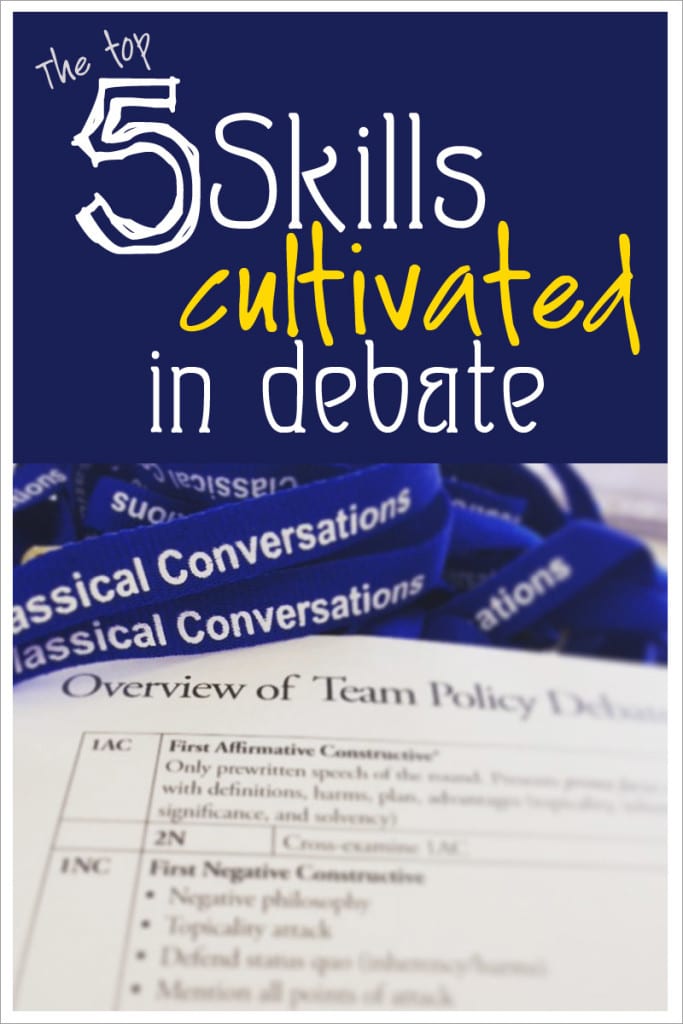The Top 5 Skills Cultivated in Debate
Last week I had the opportunity to help out with a student Debate camp at a Classical Conversations Parent Practicum. While the parents receive encouragement and training, children attend various academic camps from play camp, to geo/draw camp, to writing camps or debate camps.
Even though I was "helping," I really feel like I was the one who received an education! Next year I will be tutoring Challenge I, which includes Team Policy Debate, so I thought it would be nice to get a little of the grammar of debate in order to confidently lead my class. As I sat and absorbed the wisdom from the young, nearly 20-year-old debater, I realized that the skills we would learn in debating could transform any argument in my life from this point forward.
So here's my introduction to the grammar of debate, and/or my top 5 ways that debate could transform my marriage:
A debate consists of eight speeches. In team policy debate, there are two teams made up of two debaters each. One team takes the negative side (they don't like change), and the other team takes the affirmative side (they don't like how things currently are). Starting with the affirmative speech, the debate naturally goes back and forth between sides bringing up ideas and allowing the other team to respond to the ideas, while bringing up their own ideas. This is the constructive portion of the debate. Midway through, the pattern shifts and the negative takes the lead arguing against the points raised in the affirmative speeches. Again, the two sides alternate giving speeches, until all eight speeches are complete. This is the rebuttal portion of the debate. A complete debate takes approximately 90 minutes from start to finish.
The first main skill focuses on attentiveness:

When I first heard we were going to learn to "flow," I had no idea what that would look like in debate. It turns out that debaters rely heavily on the notes they take during each speech in order to respond well during their own constructive speech, or later when they are refuting the opposing team's argument. The system for their note taking is called "flowing." Students learn to take notes in columns, use short-hand symbols and abbreviations to quickly write down the main ideas of a speech to which they can then respond.

Pause with me and imagine what this would look like if you tried it in your next argument with your husband. Each would come prepared with a reasonable position on an issue. You would take notes as the other spoke so that you could actually respond to what was said, and once you entered the "rebuttal" round, you would no longer be able to present any new issues or evidence. Revolutionary. We might actually get somewhere!
The second main skill focuses on clarity:

Since all debaters anticipate their listeners taking notes, they are kind to their listener and offer them "sign posts" to help them track during the speech. This is much like a pastor might do in a sermon when he says, "The third aspect of love seen in 1 Corinthians 13 is..." Adhering to a typical debate speech pattern, the debater can refer to what section they are in as they speak. If they're discussing the advantage, they might say, "The first advantage of my plan is..." As a listener, knowing that the speaker will offer signposts allows one to clearly understand what specifically to attend to during the speech.
Did you catch that? What if your case you brought before your husband was actually structured in such a way that he could clearly tell what was important to attend to, and what was simply elaboration on a point. Remarkable. He might actually be willing to listen to me more often!
The third main skill focuses on brevity:

One of the most important elements in a debate is evidence. Thankfully, a debater cannot simply argue a point based on opinion. They must research, compile evidence, and order it in a persuasive manner. Since they are attempting to present compelling evidence, they introduce each element with a "tag" in order to draw attention to why they are bringing forth this information. The tag is what a listener will jot down as they are flowing. I like to think of it like a really clever hashtag.
Are you starting to see the correlations to marriage arguments? If I would give my evidence in an argument a brief and powerful tag line, my husband would surely be more willing to listen to the evidence because he's not trying to interpret my intentions as he listens. He'll just be free to decide if that evidence supports the argument I'm making. I think he might be less defensive if I was straightforward with him!
The fourth main skill focuses on action:

Okay, so I may have a compelling issue, a clear presentation, and convincing evidence, but if I don't have a plan for how to change the situation, what good is arguing the issue? In debate, they learn to develop a plan that includes who will make sure their idea happens (agency), who will enforce the plan (enforcement), the specifics of the plan (mandates), who will cover the cost of implementation (funding), and when the plan should happen (timeline). The plan is specific and measurable.
Conviction. Guilt. Embarrassment over my arrogance. I will admit that typically when I bring up an "issue," I expect my husband to dream up the best way to meet my needs without any input from me. If I flipped my expectations upside-down and approached my husband with an issue, and armed with a plan, wouldn't that show him more love? But I know all of that would take time and preparation. Would that mean that I would think twice before bringing up an issue? Would I count the cost before pelting him with my list of complaints? Um...I think so.
The fifth main skill focuses on patterns:

When I first heard "stock issues," I thought they meant a collection of issues that are commonly debated. Wrong again. The stock issues are elements of focus for each debate. They exhibit patterns of persuasive points in which a debater might win an argument. There are four stock issues:
- Topicality - does the debater stay on topic? Do they change the definition of a term in the middle of a debate?
- Significance - Does something really need to be changed? What is being harmed? What facts are compelling to the argument?
- Inherency - Is there already something in place to deal with the problem? Are the harms actually being caused by the issue at hand?
- Solvency - Will the plan actually solve the problem?
A debater learns that these four main issues are at the heart of every argument. By focusing on these, the debate can fulfill its intended purpose: making a decision on an issue.
When have I ever evaluated an argument based on topicality, significance, inherency, and solvency. If I took good notes, I might be able to clearly point out miscommunications between me and my husband. I could look back and see that the issue is not being resolved because at the first of the argument we were defining a term one way, then as the discussion progressed, the definition morphed into something wholly different.
I have a lot to learn when it comes to arguing well. I look forward to cultivating my own skills of debate, but even more so, I'm excited to equip my kids with tools for arguing well so that their relationships might lack some of the heated disagreements that they've witnessed from their parents' lack of self-discipline in debating.

Betsy Strauss is an unexpected homeschooler, mother of three, who is in a relationship with a sweet man for life. She loves reading books, drinking coffee, and learning anything with her kids.

